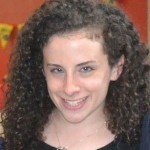Musings from Students of the Pardes Institute of Jewish Studies in Jerusalem
Posted on June 20, 2014 by Hannah Joy
From my blog:
 I’ve been back for almost two weeks now, and I already miss everything: the Hebrew, Egged bus drivers, taxi drivers, “shabbat shaloms” from cashiers, always available shwarma, everything about Pardes, and so much more. Though I must say, I have never so appreciated the orderly lines and hassle-free grocery shopping at Shoppers as I have this week.
I’ve been back for almost two weeks now, and I already miss everything: the Hebrew, Egged bus drivers, taxi drivers, “shabbat shaloms” from cashiers, always available shwarma, everything about Pardes, and so much more. Though I must say, I have never so appreciated the orderly lines and hassle-free grocery shopping at Shoppers as I have this week.
I’ve done a lot of learning this year: reading, talking, thinking, writing, listening, debating. Still, I think my favorite way to learn is through stories. These have been accumulating throughout the year (as stories tend to do in Israel), and I’ve shared some of my favorites below:
For my social action project this semester, I volunteered with a few other Pardes students by packaging dry goods at Ezrat Avot, an organization that provides for the poor elderly of Jerusalem. Ezrat Avot was started in 1976 when prominent Yemenite community leader Rabbi Sholo Gamiel, with the help of his granddaughter, opened his home and started providing shelter and food for his neighbors in need. The organization has grown tremendously since then, and they’re hoping to open a full-service senior care center soon. You can read more about them in this article.
And if that wasn’t impressive enough…
When he started this endeavor, Rabbi Gamiel was 106 years old! As Aviah, one of the staff members at Ezrat Avot, told us: this just goes to show – if you ever think it’s too late or you’re too old to start something, that’s simply not true.
As part of Pardes’ Yom Iyun Shel Chesed (special day of kindness in memory of Ben and Marla z”l), Pardes organized visits to different organizations around Jerusalem. I chose to go to Es-Sense.
When we got there, we were greeted by the founder Shay Yacov who showed us around and told us their story. He started off making and selling soaps with his daughter who has autism, because he saw that it was an incredible tool for her to work with her hands and connect with other people. From there it grew into a full-fledged workshop, and employs adults with autism and takes student volunteers from the adjacent Ein Kerem School of Agriculture. The products (soaps, candles, lotions, lip balms, etc) are all completely natural, and smell exactly like the scent of the food they represent (lemon, vanilla, strawberry, hamentashen – you name it!)
Shay and his wife quit their day jobs to run Es-Sense full time, and they do everything themselves. Their story and products have reached far and wide, and a little while back even reached the neighbor of Whole Foods’ CEO in Austin, Texas. Shay received a call from Whole Foods asking for some samples, explaining that they’d love to have Es-Sense products in their stores. Shay said he wasn’t interested, and also it was near Passover, so if they wanted to talk to him could they please call back in a month. Some time later, a representative from Whole Foods showed up at their factory in Israel. He had been sent all the way from the States to collect samples and discuss their future business partnership. Shay, again, said he was not interested and refused to give away samples. He said the rep could buy some products if he wanted, but Shay would not be working with Whole Foods. It would require Es-Sense to upsize and outsource, and that simply was out of the question. This venture is not about profit or prestige; it’s about creating a small, dignified working environment for adults with special needs, and serving the local community.
Tucked away in Ein Kerem, Shay showed us around the little factory. He showed us the stages of production, and explained to us what some of the different chemicals were. Some of them he opened and had us smell or taste. When he got to the last jar, he didn’t open it, and told us how dangerous it would be if we did (it would fill the air with toxins, our skin would burn, etc). “Shouldn’t you put a lock on it? Or warning sign? Or something?” we asked nervously. “Nah, it’s okay,” he said. “Everyone knows not to touch it.”
Only in Israel!